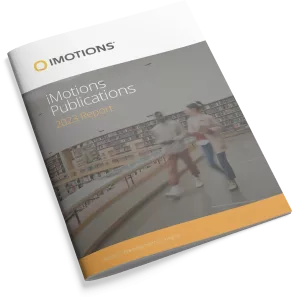-
Do instructional manipulation checks measure inattention or miscomprehension?
Instructional Manipulation Checks (IMCs) are intended to detect inattention, a common occurrence in survey responding. We use eye tracking to empirically assess the attention that survey respondents dedicate to a short and a long IMC. We find that all 21 respondents pass the short IMC. In contrast, six respondents fail the long IMC. Our eye-tracking […]
-
Message personalization and real-time adaptation as next innovations in sport sponsorship management?
Message personalization and real-time adaptation as next innovations in sport sponsorship management? How run-of-play and team affiliation affect viewer response Highlights The digitization of sports content and technological innovations in sports media offer disruptive new ways to adapt sponsor messages to real-time events during live broadcasts. To date, sponsorship management mostly ignores the run-of-play and […]
-
Engaging Learners in Synchronous Online Training Using Facial Expression Analysis Technology
The rapid growth of digitalization and the rise in the number of remote work environments have amplified the importance of remote training using online learning platforms. The effectiveness of online training relies on factors such as training content, methods, trainer skills, and technology platforms. In addition to these internal, and generally, controllable factors, various uncontrollable […]
-
Communication Skills Training Intervention Based on Automated Recognition of Nonverbal Signals
There have been promising studies that show a potential of providing social signal feedback to improve communication skills. However, these studies have primarily focused on unimodal methods of feedback. In addition to this, studies do not assess whether skills are maintained after a given time. With a sample size of 22 this paper investigates whether […]
-
Driver’s Emotions Detection with Automotive Systems in Connected and Autonomous Vehicles (CAVs)
Abstract: The aim of this work is to evaluate selected systems in order to assess the emotional state of drivers based on facial analysis and vital signs acquired from camera, galvanic skin response (GSR) and photo plethysmography (PPG). Facial analysis and biomedical variables like galvanic skin response, which is related to sympatho-vagal nervous system balance, […]
-
Bicyclists’ behavioral and physiological responses to varying roadway conditions and bicycle infrastructure
Population growth increase of vehicle ownership, and development patterns have resulted in greater levels of congestion, pollution, and crash frequency. A proposed solution to lessen current transportation system demands is to increase the share of bicycle trips. Furthermore, as cycling is perceived by some as both a dangerous and stressful mode of transportation, understanding the […]
-
Investigation of eye tracking, electrodermal activity and facial expressions as biometric signatures of food reward and intake in normal weight adults
Pervasive exposure to a vast and varied food repertoire has contributed to the obesity epidemic. Within this issue, there is a need for a better understanding of the psychophysiological responses to food cues that precede food choice and food intake to establish how these responses contribute to the link between food availability and increasing obesity […]
-
Forecasting Advertisement Effectiveness: Neuroscience and Data Envelopment Analysis
This research used a novel method in which biometric data and data envelopment analysis (DEA) (a statistical tool generally used for multi-criteria decision making) were used to assess advertising effectiveness. Facial detection and eye-tracking analyses were used to measure participants’ reactions to 14 real estate advertisements. Each of the 14 advertisements had been suggested to […]
-
Processing of infant emotion in mothers with mood disorders and implications for infant development
Background Atypical neurocognitive responses to emotional stimuli are core features of unipolar depression (UD) and bipolar disorder (BD). For mothers with these mood disorders, this may influence interactions with their infants and consequently infant development. The study aimed to investigate psychophysiological and cognitive responses to infant emotional stimuli, and their relation to mother–infant interaction and […]
-
A User Study on User Attention for an Interactive Content-based Image Search System
User attention is one of the fundamental indications of users’ interests in search. For content-based image search systems, it is important to understand what users pay attention to, and thus engage users more in the search process. It remains a big challenge to design a user-centered interactive interface that serves well for both user interaction […]
Research Report 2024
In-depth look at the scientific landscape as powered by iMotions software, showcasing groundbreaking research and the impact of our tools in various scientific and industrial fields.
iMotions Science Resources
Looking for white papers, validation reports or research show casing iMotions Multimodal capabilities?
Share Your Research

850+ universities worldwide with an iMotions human behavior lab
73 of the top 100 highest ranked universities
710+ published research papers using iMotions
iMotions is used for some of the most interesting human behavior research studies carried out by top researchers around the world. Contact us to have your publication featured here.
The authors of these publications have used iMotions as a software tool within their research.
“Software should be cited on the same basis as any other research product such as a paper or a book; that is, authors should cite the appropriate set of software products just as they cite the appropriate set of papers” (Katz et al., 2020).
We therefore encourage you to cite the use of iMotions where appropriate.
How to cite iMotions
APA
iMotions (10), iMotions A/S, Copenhagen, Denmark, (2024).
Note: adjust the version and year where relevant.
5 Most Popular Blogs
Learn How to Conduct Human Behavior Research with iMotions
Publications
Read publications made possible with iMotions
Blog
Get inspired and learn more from our expert content writers
Newsletter
A monthly close up of latest product and research news



